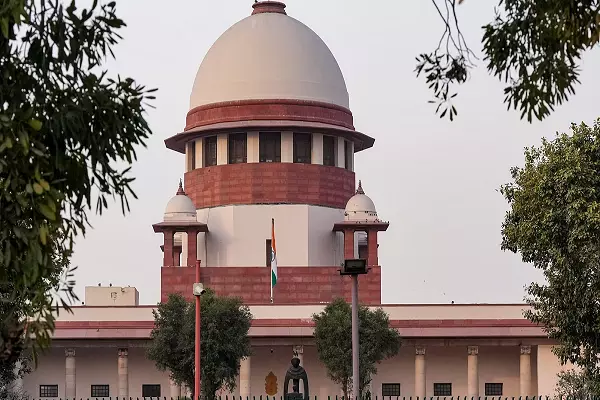
SC to consider urgent listing of plea seeking restoration of statehood to J&K in time-bound manner

New Delhi (Uttam Hindu News) : The Supreme Court on Thursday agreed to consider the urgent listing of a plea seeking restoration of statehood to Jammu and Kashmir in a time-bound manner. Chief Justice of India D.Y. Chandrachud said that he would deal with the prayer for urgent listing after the matter was mentioned by senior advocate Gopal Sankaranarayanan, who appeared on behalf of the applicants. The application said that even after ten months of the SC verdict, the statehood of J&K has not yet been restored "which is gravely affecting the rights of the citizens of Jammu and Kashmir and also violating the idea of federalism".
It said that "formation of the Legislative Assembly before the restoration of statehood would cause serious reduction of the democratically elected government in Jammu and Kashmir causing a grave violation of the idea of federalism which forms part of the basic structure of the Constitution of India". Assembly elections were recently held in Jammu and Kashmir in three phases after a period of 10 years and the results were declared last week. "In re: Article 370 of the Constitution" verdict, a 5-judge Constitution Bench, headed by CJI D.Y. Chandrachud, had left open the question of whether the Parliament can extinguish the character of statehood by converting a state into one or more Union Territories, relying on the statement made by Solicitor General Tushar Mehta that statehood would be restored to Jammu and Kashmir.
However, it had ordered the Election Commission of India to take steps to conduct elections to the Legislative Assembly of Jammu and Kashmir, constituted under Section 14 of the Reorganisation Act, by September 30, 2024, and said that "restoration of statehood shall take place at the earliest and as soon as possible". The Constitution Bench, also comprising Justices S.K. Kaul, Sanjiv Khanna, B.R. Gavai and Surya Kant, upheld the status of Ladakh as a Union Territory under Article 3(a) read with Explanation I of the Constitution, which permits the formation of a Union Territory by separating a territory from any state.
In the course of the oral hearing, SG Mehta had submitted that the Centre cannot give any exact timeframe and it would take "some time" for the restoration of statehood in Jammu and Kashmir. In May this year, the apex court refused to review the Constitution Bench verdict and dismissed a batch of review pleas filed against the decision upholding the revocation of Article 370 as valid. Rejecting the applications seeking listing of the review petition in open court, a five-judge bench headed by CJI Chandrachud, said that there was no error apparent on the face of the record and no case for review was made under the Supreme Court Rules, 2013. On Monday, the top court declined to entertain a plea challenging the Jammu and Kashmir Lt Governor's power to nominate five members to the Assembly on the recommendations of the Union Ministry of Home Affairs and told the petitioner, a Congress leader, to approach the J&K High Court first.
"We are not inclined to entertain the present petition filed under Article 32 of the Constitution of India and give liberty to the petitioner to approach the jurisdictional high court by way of a writ petition under Article 226 of the Constitution of India," the SC ordered, clarifying that it has not expressed any "opinion on merits". As per the J&K Reorganisation Act 2019 and J&K Reorganisation Amendment Act 2013, all the five nominated members will have voting rights in government formation. Among the nominated members, two will be women, two from the Kashmiri Pandit displaced community, including at least one woman, and one from the West Pakistan refugees.

